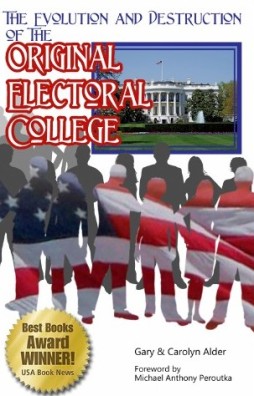Lesson 2 Assignment 2
Student Responses:
“Assignment 2: Rewriting of three sentences in Federalist No. 37
Sentence 1 – When debating or discussing issues effecting politics’ tendency toward corruption rather than the benefit of the people passions are often too extreme or heated when calmer interactions would be best.
Sentence 2 – Those who know men’s minds understand there are many new, non-traditional approaches being presented at this convention which leads to the expectation of emotional stances and arguments on both sides of every issue under consideration.
Sentence 3 – Reading the challenges to this constitution written by some it is clear they were already determined not merely to alter it but to condemn it entirely; still others are so enamored by it their words are written with an eye toward nothing but praise and urging of its ratification proving both extremes have little value for carefully considering the merits proposed.”
—Gary Wood
“In Federalist No. 37, James Madison encourages the people of the State of New York to take a fair and unbiased approach to examining the merits of the proposed Constitution. In our search for the American constitutional paradigm we are trying to see the Constitution through the eyes of the Framers. Please look at the following 3 sentence excerpt from Federalist No. 37 and re-write what is being said in these sentences. In the text the sentences are all together in one paragraph. We have separated these sentences for you to assist you in your work of learning the language of the Framers.
Excerpts from Federalist No. 37
It is a misfortune, inseparable from human affairs, that public measures are rarely investigated with that spirit of moderation which is essential to a just estimate of their real tendency to advance or obstruct the public good; and that this spirit is more apt to be diminished than promoted, by those occasions which require an unusual exercise of it.
Laws and governments should be established for the public good. To do so requires much investigation on what the public good really is. Most laws are made diminishing public good rather than promoting it because of lack of investigation.
To those who have been led by experience to attend to this consideration, it could not appear surprising, that the act of the convention, which recommends so many important changes and innovations, which may be viewed in so many lights and relations, and which touches the springs of so many passions and interests, should find or excite dispositions unfriendly, both on one side and on the other, to a fair discussion and accurate judgment of its merits.
Please judge correctly.
In some, it has been too evident from their own publications, that they have scanned the proposed Constitution, not only with a predisposition to censure, but with a predetermination to condemn; as the language held by others betrays an opposite predetermination or bias, which must render their opinions also of little moment in the question.
Please don’t prejudge to condemn”
—Adam Alder
“Excerpts from Federalist No. 37
It is a misfortune, inseparable from human affairs, that public measures are rarely investigated with that spirit of moderation which is essential to a just estimate of their real tendency to advance or obstruct the public good; and that this spirit is more apt to be diminished than promoted, by those occasions which require an unusual exercise of it.
Unfortunately, it is a natural tenancy, that we rarely objectively evaluate the political issues, as to whether or not they are really for the best god of the public; and we are more likely not to carefully analyze the issues which are the most important.
To those who have been led by experience to attend to this consideration, it could not appear surprising, that the act of the convention, which recommends so many important changes and innovations, which may be viewed in so many lights and relations, and which touches the springs of so many passions and interests, should find or excite dispositions unfriendly, both on one side and on the other, to a fair discussion and accurate judgment of its merits.
To those who are accustomed to studying the public issues, it is not surprising, that the newly proposed political measures by the convention, which recommends so many radical changes will be hot topics of displeasure by both those who are for it and against it, that the proposals may not get a fair and accurate assessment of its merits.
In some, it has been too evident from their own publications, that they have scanned the proposed Constitution, not only with a predisposition to censure, but with a predetermination to condemn; as the language held by others betrays an opposite predetermination or bias, which must render their opinions also of little moment in the question.
It is evident that some journalists have scanned the proposed Constitution, with intentions to censure and condemn it before throughly studying it and likewise others are for it, without substantiating their reasons.”—Carolyn Alder
“It is unfortunate, but true to human behavior, that changes in laws or government are rarely considered in a calm and deliberate way, so as to determine whether they will improve things or worsen them. Moreover, times where such calm deliberation is called for tend to discourage, rather than encourage, it. To those who have reflected upon this through their own experience, it should come as no surprise that the results of the convention have excited opinions on both sides against a fair discussion and correct assessment of its merits, especially considering that it recommends so many important changes and innovations that can be seen in so many different ways, and from so many different perspectives, and that touches on so many items that are close to the minds and hearts, and wallets, of so many people. In some cases, it is all too clear, from their own statements, that they have skimmed through the proposed Constitution, not only with a mindset to criticize, but to reject it altogether. Conversely, the statements of others show a just as determined, but opposite, mindset to approve merely on the face of it, that their opinions are just as shallow and insignificant.”
—Eric Colby
“If I were to simply sum up what is said, it would be “Politics attract more passion than objectivity. The judgments of those who decide negatively before even studying the proposed Consitution cannot be relied on.”
To put it in more drawn out language:Unfortunately, when it comes to politics, people tend to let their passions range free rather than examine the issues involved with objectivity. Lack of objectivity distorts the truth and diminishes a person’s ability to pass informed judgment.
The Constitutional Convention recommended not merely minor changes, but a radical departure in form and operation of government. Therefore, as anyone who has seen the passions aroused by politics understands, these changes excited so much contention that it was difficult to judge the proposed Constitution on its own merits.
As apparent from their written diatribes, some have merely scanned the proposed Constitution with an eye single to finding fault, their negativity being decided even before reading the document. Their opinions, based on such bias, can be of little use in judging whether the Constitution will be good for the public well being of this country or detract from it.”—Mary Hokanson
“It is a misfortune, inseparable from human affairs, that public measures are rarely investigated with that spirit of moderation which is essential to a just estimate of their real tendency to advance or obstruct the public good; and that this spirit is more apt to be diminished than promoted, by those occasions which require an unusual exercise of it.”
–It is a sad state when the research (or public discussion/debate) to fully understand proposed legislation does not happen. That the spirit of the public discourse is heated, cantankerous, and drastically cut short to push an agenda through the legislative bodies when a more respectful dialogue is required.
“To those who have been led by experience to attend to this consideration, it could not appear surprising, that the act of the convention, which recommends so many important changes and innovations, which may be viewed in so many lights and relations, and which touches the springs of so many passions and interests, should find or excite dispositions unfriendly, both on one side and on the other, to a fair discussion and accurate judgment of its merits.”
–With all of the proposed changes it is not surprising that opinions vary greatly, but why do those who voice their opinion so forcefully preempt a fair debate on the issues.
“In some, it has been too evident from their own publications, that they have scanned the proposed Constitution, not only with a predisposition to censure, but with a predetermination to condemn; as the language held by others betrays an opposite predetermination or bias, which must render their opinions also of little moment in the question.”
–It is obvious that there are those, who don’t know all of the facts, who are quick to judge, who on the one side will do anything to portray the question at hand negatively and on the other side are those who disregard the dissenting voices with equal ferocity to paint it in the positive. Thus drowning out those who desire to respectfully debate the issue.
—Blake Tuddenham


